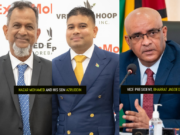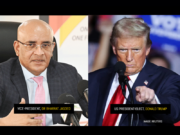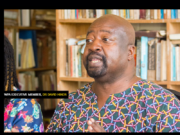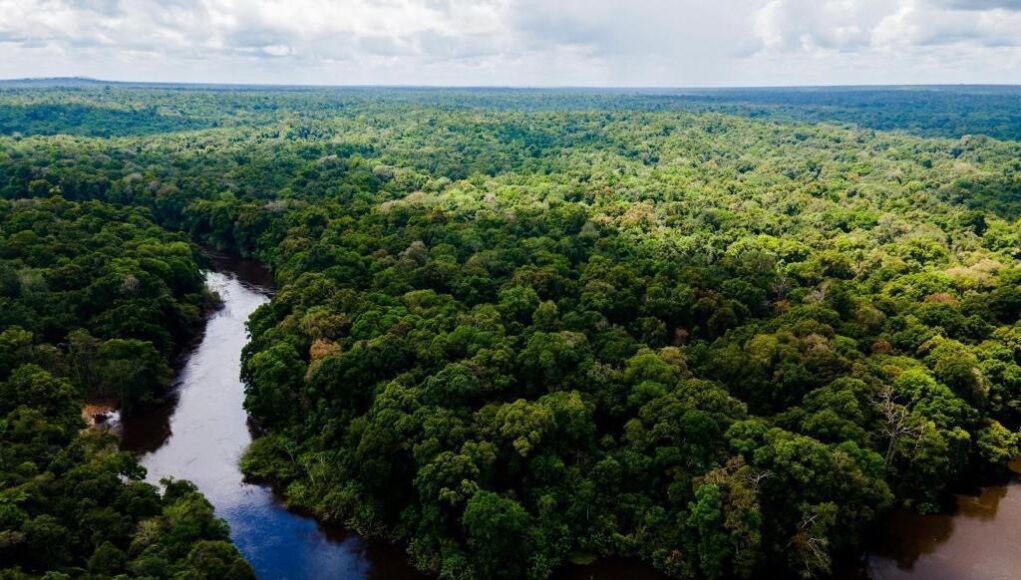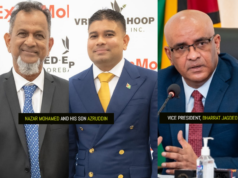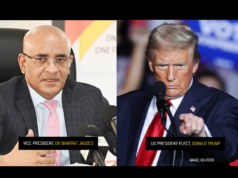Acknowledging the devastating effects of climate change and the urgent need for coordinated meaningful action, President Dr Mohamed Irfaan Ali has stated that developing nations can play a crucial role in crafting and implementing sustainable solutions to tackle the global climate crisis.
The president was at the time addressing a high-level discussion on ‘Restoring Ambition for International Climate and Development: Learning from Guyana’s Low Carbon Development Strategy, and Its Global Model for Forest Finance’ at the Arthur Chung Conference Centre on Tuesday.

President Ali said that developing countries in the Global South are increasingly showing leadership in climate action, renewable energy investment, and setting ambitious targets, despite facing obstacles from climate skeptics and those who engage in empty rhetoric rather than detailed, analytical work.
He pointed out that these nations are proving their capacity to drive innovative climate solutions, citing examples such as Costa Rica’s success in conservation and renewable energy.
“It is not just big nations that we must analyse. We also have to look at what small countries across Africa, Asia and Latin America are doing, because there is a lot that they are doing in stepping up as well. Rwanda, a leader in forest restoration… [these countries] are showing that size does not limit leadership,” the president underlined.
He further underscored, “The global south is proving that innovative solutions to the climate crisis can and are being driven from all corners of the world.”
President Ali emphasised that developing countries are no longer content to be seen as just ‘problems’ for the world to solve. He said these countries are instead positioning themselves as leaders in finding solutions and driving global policy.
Guyana has also demonstrated leadership in developing innovative policies like the Low Carbon Development Strategy 2030 (LCDS2030), which has become a model for global climate action.

The LCDS focuses on preserving the country’s vast rainforest, a significant carbon sink. It outlines strategic investments in renewable energy, coastal defences, sustainable agriculture and community-based adaptation, among other key measures, in Guyana’s endeavour to build a more resilient future in the face of climate change.
He added that partnerships and international cooperation are crucial, pointing to Guyana’s strong relationships with allies like Norway and the United Kingdom’s Kings Foundation to support its sustainability efforts.
Moreover, the Guyanese leader lamented that financing and fair policies are still major challenges, emphasising a need for more concessional climate financing and equitable approaches that do not disadvantage developing countries.
“Despite their flourishing leadership, the global south’s efforts are being stymied, and this is also a fact. If you look, for example, at the pledges that were made, and look at the implementation of those pledges…if you look at the translation from pledges to actual financing, it is shocking,” the president highlighted.
In this regard, he reiterated Guyana’s strong support for the Bridgetown Initiative, piloted by the Prime Minister of Barbados, Mia Mottley, which calls for a reform of the international financial architecture (IFA) that governs the way finance is disbursed for climate adaptation and mitigation.
“This is why we have long advocated for carbon pricing and elimination of fossil fuel subsidies, starting with the richest countries. We have also called for massive investments in clean and renewable energy globally. These are measures that will drive meaningful progress in decarbonising the global economy,” he said.
Guyana has made concrete, measurable progress in areas like carbon credit sales, sustainable forestry, and mineral mapping to support the global energy transition.
The president said that this demonstrates that developing countries can deliver real solutions through hard work and partnership.

The high-level discussion also saw key input from an International Environmental Advisor, Former Minister of Climate and the Environment and Former Minister of International Affairs of Norway, Erik Solheim.
Senior Minister in the Office of the President with Responsibility for Finance and Public Service, Dr Ashni Singh, Attorney General and Minister of Legal Affairs, Anil Nandlall, other cabinet ministers, members of the diplomatic corps, regional officials, representatives from the Guyana Forestry Commission, the Guyana Energy Agency and other key stakeholders were also in attendance. (Extracted from the Department of Public Information)
